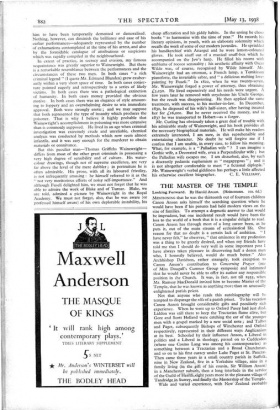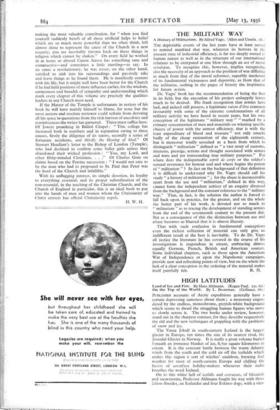THE MASTER OF THE TEMPLE
Looking Forward. By Harold Anson. (Heinemann. ros. 6d.)
MENTIONING that he was the thirteenth out of fourteen children Canon Anson asks himself the searching question where he would have been if his parents had held modern views on the size of families. To attempt a dogmatic answer to drat would be imprudent, but one incidental result would have been the loss to the world of a book that it is a singular delight to read. Canon Anson has through most of a long career been as he puts it, out of the main stream of ecdesiastical life. One reason for that no doubt is a certain lack of ambition. " I have never felt," he observes, " that eminence in my profession was a thing to be greatly desired, and when my friends have told me that I should do very well in some important post I have always taken pleasure in discovering half a dozen men who, I honestly believed, would do much better." Also Archbishop Davidson, rather strangely, took exception to Canon Anson's contribution to Concerning Prayer (one of Miss Dougall's Cumnor Group symposia) and intimated that he would never be able to offer its author any responsible position in the Church. It was, in fact, not till 1935, when Mr. Ramsay MacDonald invited him to become Master of the Temple, that he was known as anything more than an unusually enlightened parish priest.
Not that anyone who reads this autobiography will be tempted to disparage the role of a parish priest. To his vocation Canon Anson brought considerable gifts and peculiarly rich experience. When he went up to Oxford Pusey had just died, Liddon was still there to keep the Tractarian flame alive, but Gore and Scott Holland were catching the ear of the younger men with a gospel marked by a new social note ; and Talbot and Paget, subsequently Bishops of Winchester and Oxford respectively, represented in their different ways Anglicanism at its best. Schooled by their influence Anson, a Liberal in politics and a Liberal in theology, passed on to Cuddesdon (where one Cosmo Lang was among his contemporaries) as something between a Tractarian and a Broad Churchman, and so on to his first curacy under Luke Paget at St. Pancras. Then came three years in a small country parish in Suffolk, nine in New Zealand, five in a Yorkshire village, nine in a family living (in the .gift of his cousin, Sir William Anson) in a Manchester suburb, then a long interlude in the service of the Guild of ealiti, eight years more in the pleasant village of Tandridgejn Surrey, and finally the Mastership of the Temple.
Wide and 'varied experience, with New Zealand probably making the most valuable contribution, for " when you find yourself suddenly bereft of all those artificial helps to belief which are so much more powerful than we often think, left almost alone to represent the cause of the Church in a new country, you are inevitably thrown back on those things in religion which cannot be shaken." On every field he worked in at home or abroad Canon Anson has something sane and constructive—and sometimes a little startling—to say. In no sense a revolutionary, he was never, on the other hand, satisfied to sink into his surroundings and passively take and leave things as he found them. He is manifestly content with his life, but it might well have been better for the Church if he had held positions of more influence earlier, for the wisdom, earnestness and breadth of sympathy and understanding which mark every chapter of this volume are precisely the qualities leaders in any Church most need.
If the Master of the Temple is unfortunate in notices of his book he will have mainly himself to blame, for none but the most austere and resolute reviewer could refrain from devoting all his space to quotations from the rich harvest of anecdotes and reminiscences the writer has garnered. Three must suffice here. Of Jowett preaching in Balliol Chapel : " This college has increased both in numbers and in reputation owing to three causes, firstly the diligence of its tutors, secondly a series of fortunate accidents, and thirdly the blessing of God." Of Stewart Headlam's letter to the Bishop of London (Temple), who had declined to confirm some ballet girls unless they abandoned their wicked profession : " You, my Lord, and other filthy-minded Christians. . . ." Of Charles Gore on claims based on the Petrine succession : " I would not care to be the man who had to propound to St. Paul that Peter was the head of the Church and infallible."
With its unflagging interest, its simple devotion, its loyalty to everything essential, and its proper subordination of the non-essential, in the teaching of the Christian Church, and the Church of England in particular, this is an ideal book to put into the hands of men and women whom the Christianity of Christ attracts but official Christianity repels.
H. W. H.















































 Previous page
Previous page